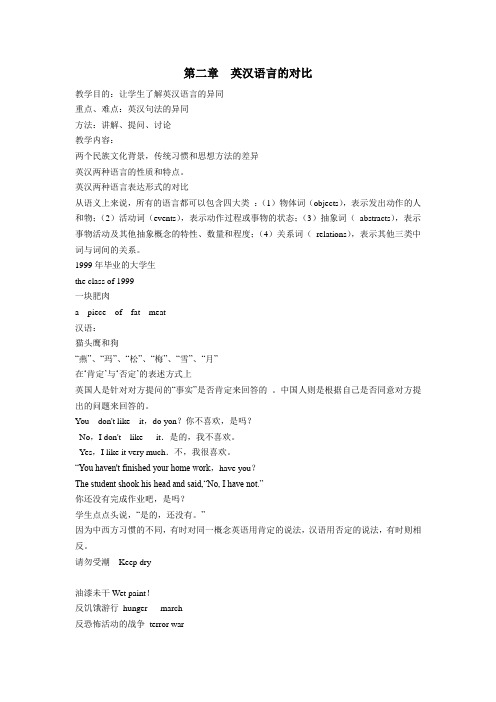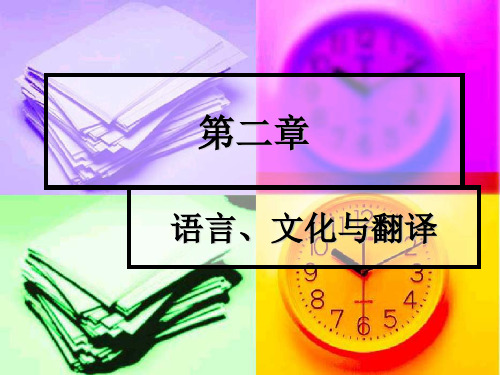第二章英汉语言比较
- 格式:ppt
- 大小:287.50 KB
- 文档页数:18

第二章英汉语言对比A Comparison between English and Chinese第二部分Part TwoProcedures of today:●Differences between English and Chinese syntax●Differences between English and Chinese rhetoric●Differences between English and Chinese discourse●Exercises in class●Assignments of today●“…so far as English and Chinese are concerned, the most important difference linguistically is the contrast between hypotaxis and parataxis.”E. A. Nida●就汉语和英语而言,也许在语言学上最重要的一个区别,就是形合和意合的对比。
Differences between syntax:●形合与意合(hypotaxis and parataxis): 英汉两种语言最本质的区别●Hypotaxis: The dependent or subordinate construction or relationship of clauses with connectives, e.g.I shall despair if you don‟t come.●形合指句中的词语或分句之间需要一种语言形式手段(如连词或关联词)连接起来,表达一定的语法意义和逻辑关系。
●Parataxis: The juxtaposition of clauses or phrases without the use of coordinating or subordinating conjunctions, e.g.The rain fell; the river flooded; the houses were washed away.●意合指词语或分句之间不用语言形式手段进行连接,句中的语法意义和逻辑关系通过词语或分句的含义来表达。




第二章英汉语言比较五.翻译练习True Lies A World without Thieves The Dream Factory Shawshank RedemptionSix of one and half a dozen of the other 半斤八两隔墙有耳Walls have ears. 鱼米之乡a land of milk and honey 白马王子、梦中情人Mr./Mrs. Right; Prince Charming Rob Peter to pay Paul 拆东墙补西墙I gave my youth to the sea and I came home and gave my wife my old age. 直:我把青春献给海洋,我回家的时候便把老年给了我的妻子。
意:我把青春献给海洋,等我回到家里见到妻子的时候,已经是白发苍苍。
少时海为家,归乡两鬓斑。
青春献海洋,暮年伴我妻。
Smashing a mirror is no way to make an ugly person beautiful, nor is it a way to make social problems evaporate. 直:砸镜子不能使丑八怪变漂亮,也不能使社会问题烟消云散。
意:逃避并不能解决实际问题。
第二章英汉语言比较English belongs to the Germanic branch of the Indo-European language family(印欧语系). Chinese belongs to the Sino-Tibetan language family(汉藏语系). It is well known that English has the richest vocabulary of any European language. On the basis of Angles’ language (Anglo-Saxon), English was built by absorbing words in various languages.Vocabulary 在英语史上,英语吸收了大量其他语言的词汇,在英语史上,英语吸收了大量其他语言的词汇,加上英语本身就具有很多同义词。







英汉语言对比一、英汉词汇对比第一节英汉词汇量对比汉字有多少呢?根据统计如下:商朝:甲骨文约为3500—4500字。
汉朝:许慎《说文解字》收录9353字。
清朝:张玉书等《康熙字典》收录47035字。
当代:《中华大字典》收录48000字;《汉语大字典》收录56000字;《中华字海》收录861300字。
根据对文字资料的统计,从商代到现代,一般使用的汉字数量没有显著的变化,可能一直在五六千左右。
近年来制订的具有通用字表性质的汉字标准,基本上维持了这一数目。
如《印刷通用汉字字形表》收字6196个,国家标准《信息交换用汉字编码字符表》收字6763个。
根据近年来实际使用的情况,国家语委在1988年研制成的《现代汉语通用字表》,共收字7000个。
汉语新词语虽然也层出不穷,但极少有新字产生。
偶有新字产生,用偏旁部首加谐音字根一并便成了。
汉语的构词法,不像英语那样不断衍生.靠的是固有的汉字的灵活组构,因此汉字总量总能保持在一定的数量之内。
随着时代的发展,常用汉字不但没有增长,反而有所减少——一些老字不断被赋予新意,而更多的古字则逐渐被时代所淘汰。
英语有多少呢?中型词典如《新英汉词典》收词万余条,《远东英汉大词典》16万余条,像《牛津词典》、《韦氏词典》等大型工具书,收词量一般不下数十万。
英语的总词汇量早就超过了百万大关。
第二节英文文字的效率对比英译汉和汉译英孰难孰易?汉字简捷还是英文简捷?我们从语音、书写形式、文字承载能力和构词四方面加以讨论。
语音的基本单位是音节。
中文(汉语)词汇是以单一双音节为主。
所有拼音文字(例如英文、俄文等)的词汇是多音节的,但是它们中的常见字、常用字也同样是单一双音节,所以它们的效率也比较高,但是它们的音节由于含有辅音。
往往比汉语的音节长些。
在书写形式上汉语中的词并不像英语那样在句中分开书写,因而没有明显的书写形式或标志。
如:John saw Bill.这说明汉字节省空间单位。
其次,汉语中的某些语素可以互换位置而组成不同的词,如“算盘”与“盘算”、“平生”与“生平”、“计算”与“算计”等。

A Contrastive Study of Chinese and English (II)1 Topic-prominent vs. Subjectprominent2 Hypotactic vs. Paratactic3 Left-branching vs. Right-branching4 Top-heavy vs. End-weightContrast Between English and ChineseChineseTopic-Comment Sentence Structure 话题-评论结构结构) (话题-评论结构)EnglishSubject-Predicate Sentence Structure 主语-谓语结构) (主语-谓语结构)TopicSubjectTopic-prominent Subject-prominent Language Language 主语突出型语言话题突出型语言In an English sentence, prominence is usually given to the subject. There are five basic sentence patterns in English: SV, SVC, SVO, SVO1O2, SVOC, all with SV as its essentials. We can venture to say that an English sentence is built on the subjectpredict-pivot, with the subject and predicate in agreement. On the other hand, a Chinese sentence often lays emphasis on the thought or notion, so it is based on the thought pivot.汉语:主题显著的语言(topic-prominent 汉语: language), 采用主题-述题(topic-comment)的句式"话语说明结构"汉语句子建立在意念主轴(thought-pivot)上. 英语:主语显著的语言(subject-prominent 英语: language), 几乎都采用主语-谓语(subjectpredicate) 的句式"主语谓语结构"英语句子建立在形式(或主谓)主轴(formpivot)上.赵元任先生在《汉语口语语法》(1986) 一书中指出:"在汉语里把主语,谓语当作话题和说明来看待,比较合适.". 汉语句子的"话题"与"说明"是从句子顺序上说的."话题"是说话人想要说明的对象,总是放在句子开头处.如果语言环境或上下文能暗示话题,也可能省略不提."说明"部分位于话题之后,对话题进行说明,解释或质疑.现代英语的五种基本句型:SVP,SV, 现代英语的五种基本句型: , , SVOO,SVO,SVOC都可以分为三部, , 都可以分为三部以动词为中心,前面为施动者, 分.以动词为中心,前面为施动者, 后面为受动者,没有动词就不能成为后面为受动者, 句子,缺了主语,宾语就是语法错误. 句子,缺了主语,宾语就是语法错误. 他的基础是逻辑思维. 他的基础是逻辑思维.汉语造句不大有词类的概念,只要符合阴汉语造句不大有词类的概念, 阳对立模式就行了. 阳对立模式就行了. 汉语句子只有两个部分.话题和说明.他汉语句子只有两个部分.话题和说明. 的基础是阴阳辩证. 的基础是阴阳辩证. 《诗经》是中国最早的文学精华,记录的诗经》是中国最早的文学精华, 是西周至春秋五百年间的文学创作. 是西周至春秋五百年间的文学创作.所记诗篇大多四字一顿,八字一句, 诗篇大多四字一顿,八字一句,前面四字为话题,后面四个字是说明. 为话题,后面四个字是说明."何以解忧,惟有杜康."何以解忧, 何以解忧惟有杜康."白发三千丈,缘愁似个长."白发三千丈,缘愁似个长. 满则虑嗛,平则虑险,安则虑危. 满则虑嗛平则虑险,安则虑危. 荀子) (荀子)The strange walls of the castle served as a good defense against the attackers. 原译:那城堡的坚固城墙充当了抵御进攻者的原译: 良好防御物. 良好防御物. 改译:那座城堡的城墙很坚固,在敌人的进攻改译:那座城堡的城墙很坚固, 中起到了良好的防御作用. 中起到了良好的防御作用. 评论:SVO三分结构,直译,显得不通顺.改评论: 三分结构, 三分结构直译,显得不通顺. 译为阴阳结构, 译为阴阳结构,原主语的偏正结构变为描写句名词+形容词),后句续评论.通顺, ),后句续评论(名词+形容词),后句续评论.通顺,符合汉语表达习惯. 汉语表达习惯. That dirty house is an offense to everyone who lives in the street. 那座肮脏的老房子使住在那条街上的人都很讨厌它. 人都很讨厌它. 那座老房子很脏,住在那条街上的人那座老房子很脏, 都很讨厌它. 都很讨厌它.Her effort gained her a reputation. 她的努力为他赢得了声誉. 她的努力为他赢得了声誉. 她很努力,名声很好. 她很努力,名声很好.His skill qualify him for the job. 他的技艺使他有资格担任这一工作. 他有技术,能担任这一工作. 他有技术,能担任这一工作.You are lucky enough to have a united family. 你真幸运,能有一个和睦的家庭. 你真幸运,能有一个和睦的家庭. 你家庭和睦,真有福气. 你家庭和睦,真有福气.Chinese-English 我从乡下跑到京城里,一转眼已经六年我从乡下跑到京城里, 鲁迅一件小事》鲁迅《了. 鲁迅《一件小事》Six years have slipped by since I came from the country to the capital.杨宪益, 杨宪益,戴乃迭杨宪益鲁迅《一件小事》鲁迅《一件小事》鲁迅这事到了现在,还是时时记起. 这事到了现在,还是时时记起. Even now, this remains fresh in my memory. 杨宪益杨宪益, 杨宪益,戴乃迭汉语句子的特点: 汉语句子的特点: 话题说明,叙述分层,可断可续, 话题说明,叙述分层,可断可续, 意尽为界; 意尽为界; 英语句子的特点: 英语句子的特点: 主谓搭架,枝叶上挂,叠床架屋, 主谓搭架,枝叶上挂,叠床架屋, 都有语法. 都有语法.冷死我了. 弄得不好,就会前功尽弃. 不经一事,不长一智. 在历史上由于长江不断改道,在武汉地区形成了众多的湖泊. 婚姻的事,年轻人都自己做主了. 这种鸭,觅食力强,能适应当地湖荡水网的饲养条件,而且生长速度快,产卵能力好,肉白,细嫩,味美,是优良的卵肉兼用鸭. My duty forbis me to fly from danger. 他开车时心不在焉,几乎闯祸.Contrast Between English and Chinese ChineseMeaning-focused with emphasis on implicit coherence (隐性连贯) ParatacticEnglishForm-focused with emphasis on explicit cohesion (显性联接) Hypotactic语义型语言(以意统形)形态型语言(以形驭意)①我常见许多青年的朋友,②聪明用我常见许多青年的朋友, 成绩优异, 功,③成绩优异,④而语文程度不足以达意, 甚至写一封信亦难得通顺, 以达意,⑤甚至写一封信亦难得通顺,问其故则曰其兴趣不在语文方面. ⑥问其故则曰其兴趣不在语文方面.——(梁实秋《学问与趣味》) 梁实秋《学问与趣味》梁实秋Translation 1:①I have come across a great many young friends, ②bright and diligent, ③do exceedingly well in studies, ④but they are rather weak in Chinese, ⑤even can't write a smooth Chinese letter. ⑥When asked why, they'll say they are not interested in Chinese. You are going to find out the mistakes of this paragraph and try to better the translation.I have come across a great many bright and diligent young friends who have done exceedingly well in their studies, but are rather weak in Chinese. They cannot even write a letter in correct Chinese. When I asked them why, they said they were not interested in the Chinese language. —— (张培基张培基) 张培基It is a curious fact, of which I can think of no satisfactory explanation, that enthusiasm for country life and love of natural scenery are strongest and most widely diffused precisely in those European countries which have the worst climate and where the search for the picturesque involves the greatest discomfort.AIdous Huxley: The CountryIt is a curious fact, of which I can think of no satisfactory explanation, that enthusiasm for country life and love of natural scenery are strongest and most widely diffused precisely in those European countries which have the worst climate and where the search for the picturesque involves the greatest discomfort. AIdous Huxley: The CountryAs E. A. Nida points out in his"Translating Meaning", …so far as English and Chinese are concerned, the most important difference linguistically is the contrast between hypotaxis and parataxis.Hypotaxis: The dependent or subordinate construction or relationship of clauses arranged with connectives; E.g. I shall despair if you don't come .(The American Heritage Dictionary, p.649 ) Parataxis: The arranging of clauses one after the other without connectives showing the relation between them; e.g. The rain fell; the river flooded; the houses were washed away. (The world Book Dictionary, p. 1513)汉语句子(parataxis) 语义型或意合型依仗汉语句子: 意义,即内在的逻辑关系组织语言的手段. 意义,即内在的逻辑关系组织语言的手段. 以意统形""以意统形"英语句子(hypotaxis) 语法型或形合型依英语句子: ) 仗形式(包括词的形态变化,词汇的衔接等) 仗形式(包括词的形态变化,词汇的衔接等) 将语言符号由"个体的词)将语言符号由"散"(个体的词)到"集"词组乃至语篇) (词组乃至语篇)的语言组织手段——王力《中国语法理论》王力《王力中国语法理论》He succeeded in finishing his task, in spite of difficulties. With the big Bull Market gone and prosperity going American were soon to find themselves living in the altered world. It was understood that atoms were the smallest elements. It is known that atoms can be further divided into nuclear and electrons and protons, etc. 土地的价格与原来相比,已涨了两三倍.Contrast Between English and Chinese ChineseChinese: left-extending, heavy-headed like a lionEnglishEnglish: right-extending heavy-tailed like a peacock狮子型语言孔雀型语言Chinese: left-extending, heavy-headed like a lion树一棵树一棵大树一棵枝繁叶茂的大树校园里一棵枝繁叶茂的大树江汉大学文理学院校园里一棵枝繁叶茂的大树三角湖畔江汉大学文理学院校园里一棵枝繁叶茂的大树…… 汉语: 汉语:逆线性延伸首开放性(open-beginning) 尾封闭性(close-ending)He is reading. He is reading a book. He is reading a book written by Mark Twain. He is reading a book written by Mark Twain in the reading-room. He is reading a book written by Mark Twain in the reading-room on the second floor of our library. He is reading a book written by Mark Twain in the reading-room on the second floor of our library which has just opened.英语: 英语:顺线性延伸首封闭性(close-beginning) 尾开放性(open-ending)汉语:"板块型"或"竹节型"汉语句子往往汉语:是句子较短,结构紧凑,好似"万倾碧波层层推进""左分支"结构(left-branching)"后重心":重要信息放在后面."狮子头"(头大尾小)英语多枝共干型"或"葡萄串型"英语句子如英语:"老树参天, 枝杈横生", 句子长, 插入成分多, 形成复杂嵌套结构."右分支"结构(right-branching )"前重心":主要信息放在主句中,放在句首.前重后轻."孔雀尾":头小尾大由于汉语的"意合"特点,有些汉语句子的内部由于汉语的"意合"特点, 成分常常一一罗列,呈现并排式结构, 成分常常一一罗列,呈现并排式结构,外形上没主从之分,层面之间没有明显的逻辑标记. 主从之分,层面之间没有明显的逻辑标记.有人形象地把这种句子称为"板块"式结构, 形象地把这种句子称为"板块"式结构,也有人称为"竹节"式结构. 称为"竹节"式结构. 英语句子的"主谓结构"为句子主干,其它成分英语句子的"主谓结构"为句子主干, 则通过各种连带附加关系附着在这条主干上, 则通过各种连带附加关系附着在这条主干上,犹如树枝与树干的关系. 如树枝与树干的关系.人们把英语句子的这种结构称作"多枝共干"构称作"多枝共干"型.中国人的思维模式基本上是首先考虑事物的环境和外围因素, 物的环境和外围因素,然后考虑具体事物或中心事件. 物或中心事件.西方人的思维模式正相首先考虑中心事物, 反,首先考虑中心事物,然后才加上外围因素. 围因素.中西思维方式的差异,表现到句子结构上, 中西思维方式的差异,表现到句子结构上,就是汉语中的状语总放在谓语或句子主体前边,形成"左分支"结构, 语总放在谓语或句子主体前边,形成"左分支"结构,整体上显得头大尾小,有人将其比作"狮子头"形状. 上显得头大尾小,有人将其比作"狮子头"形状.村东头的王大妈来了,受坏人欺骗的村民们也来村东头的王大妈来了, 了. There came Aunt Wang who dwelt at the eastern end of the village, and also came the villagers who had been deceived by the scoundrel.英语句式正相反.英语的定语成分除单词外, 英语句式正相反.英语的定语成分除单词外,多数都置于中心词之后.多数英语状语的正常位置也是置于主干成分中心词之后. 之后,由此形成了英语的右分支结构,句子多为前短后长, 之后,由此形成了英语的右分支结构,句子多为前短后长, 有人将其形容为"孔雀尾"有人将其形容为"孔雀尾".去年他为了完成一个项目在实验室用计算机努力地干了十个月. 地干了十个月. He worked hard with a computer in the lab for ten months in order to complete a project last year.There are various kinds of waves invisible to the naked eye in the aerospace. There is no royal road to science, and only those who do not dread the fatiguing climb of the steep path have a chance of gaining its luminous summits. 家家房顶上都装了供沐浴用的太阳能热水器. 太阳风使地球磁场的形状发生变化,将它向外牵扯,扯出一条长尾.Contrast Between English and ChineseChineseOrder of linguistic elements: relatively fixed like bamboomaking (制竹) 制竹) (语序相对固定) 语序相对固定)EnglishOrder of linguistic elements: relatively flexible like blockbuilding (积木) 积木) (语序相对灵活) 语序相对灵活)Chinese: bamboo-like sentence structure (竹式结构)从前这里有一个渔村,村里住着十户人家,这十户人家全靠打鱼,种地为生,生活艰苦,但很安宁. 开始家人是不让父亲抽烟的, 得了绝症后,想开了,抽吧, 拣好的买,想抽就抽. The chunks of a sentence seem to be connected and yet separated, like sections of a bamboo linked by the joints and yet relatively independent and self-contained.English: tree-like sentence structure (树式结构)As a nation of gifted people who comprise about one-fourth of the total population of the earth, China plays in world affairs a role that can only grow more important in the years ahead. -- Jimmy CarterTrunk line: S + V + (O) Branches and sub-branches : Adverbials and attributesContrast Between English and ChineseChinesebamboo-like sentence structure (竹式结构) 竹式结构) with different sections linked and yet separatedEnglishtree-like sentence structure 树式结构) (树式结构)with different parts connected like branchesand sub-branches to the trunk lineRhythmic speech or writing is like waves of the sea, moving onward with alternating rise and fall, connected yet separated, like but different, suggestive of some law, too complex for analysis or statement, controlling the relations between wave and wave, waves and sea, phrase and phrase, phrases and speech. H. W. Fowler (1858 – 1933)Chinese Order of Linguistic Elements 汉语语序(1) 汉语语序( )Relatively fixed (相对固定) 相对固定) Order of time (时间先后顺序) 时间先后顺序) Words: 古今,先后,早晚,始终,老少,生死Idioms: 冬去春来,一呼百应,风平浪静Phrases: 进城卖菜,离家出走,去教室看书Sentences: 我们在美国读书的时候,结识了一位木匠.有一天,木匠开车接我们去他家,路上所谈,尽是木匠的事,深得其乐……Chinese Order of Linguistic Elements 汉语语序( ) 汉语语序(2)Order of space (空间大小顺序) 空间大小顺序)Words: 大小,宽窄,粗细,长短,厚薄,胖瘦Idioms: 大同小异,长话短说,厚古薄今Addresses: 中国上海康桥路1500号Sentences: 一到上海,我们首先想到浦东这片改革,开放的热土.于是我们驾车来到陆家嘴金融开发区,那节次鳞比,神态各异的摩天大楼令人眼花缭乱.我们决定先登上东方明珠广播电视塔……Chinese Order of Linguistic Elements 汉语语序( ) 汉语语序(3)Order of importance (重轻顺序) 重轻顺序)Words: 天地,日月,国家,君臣,优劣,强弱Idioms: 国破家亡,天久地长,优胜劣汰,恃强凌弱,一人得道,鸡犬升天Phrases: 红色的圆木桌,圆形的红木桌,木制的红圆桌Sentences: 我用这把刀切肉. 这把刀我用来切肉. 切肉我用这把刀.Chinese Order of Linguistic Elements 汉语语序( ) 汉语语序(4)Order of logic<cause-effect, conditionresult>(逻辑顺序:因果,条件结果) 逻辑顺序:因果,条件-结果结果) 志同道合,友谊才会持久. 名不正则言不顺,言不顺则事不成. 天下雨,运动会延期了. 他爱睡懒觉,考试难过关.English Order of Linguistic Elements 英语语序Relatively flexible order (语序相对灵活) 语序相对灵活) resulting from the use of inflections and connectives Phrases:the Russian people, a pretty and clever girl the people of Russia, a girl pretty and clever the people living in Russia, a girl who is pretty and clever the people who live in RussiaEnglish Order of Linguistic Elements 英语语序Relatively flexible order (语序相对灵活) 语序相对灵活) resulting from the use of flections and connectivesSentences:志同道合,友谊才会持久.Friendship will last only if it is based on a common goal. Only if friendship is based on a common goal, it will last.天下雨,运动会延期了. The sports meet was postponed because of rain. Because of rain, the sports meet was postponed.Please compare:We saw many signs of occupation while strolling along a street past a major concentration of the huts not far away from the Central Avenue. 我们看到很多住人的迹象, 当漫步街头走过一个很大的棚户集中地,离中央大道不远. 我们漫步街头,在中央大道附近发现了一个很大的棚户区,有很多迹象表明茅棚里还住了人.Pay attention to Chinese order of time and space.5 Top-heavy vs. End-weight前重心与后重心In an English sentence, the shorter elements usually go before longer ones in arrangement order, thus the weight of the sentence is put at the end, and the whole sentence looks like a pyramid. That also explain why there are so many inverted sentences in English. The arrangement of a Chinese sentence seems quite the opposite, where the important elements are often said at the beginning of a sentence. So it looks like an inverted pyramid or triangle.I am much abroad in my guess. 我大错特错. (英语的许多形容词表现力很强, 可以携带丰富的信息,表达复杂的内容.)英语句子和汉语句子的重心一般都落在结果, 英语句子和汉语句子的重心一般都落在结果, 结论,假设或事实上; 结论,假设或事实上; 但是重心的位置不同: 但是重心的位置不同:英语句子一般时前重汉语句子一般是后重心. 心;汉语句子一般是后重心.原因和结果生活中既有悲剧,文学作品就可以写悲生活中既有悲剧, 剧. Tragedies can be written in literature since there is tragedy in life.结论和分析揭穿这种老八股,老教条的丑态给人民看,号揭穿这种老八股,老教条的丑态给人民看, 召人民起来反对老八股,老教条, 召人民起来反对老八股,老教条,这就是五四运动时期的一个极大的功绩. 运动时期的一个极大的功绩. A tremendous achievement of the May 4th Movement was its public exposure of the ugliness of old stereotype and the old dogma and its call to the people to rise against them.假设和前提小国人民敢于起来斗争,敢于拿起武器,掌握自己小国人民敢于起来斗争,敢于拿起武器, 国家的命运,就一定能够战胜大国的侵略. 国家的命运,就一定能够战胜大国的侵略. The people of a small country can certainly defeat aggression by a big country, if only they dare to rise in struggle, dare to take up arms and grasp in their own hands the destiny of their own country.。

英汉对比2.1 英汉语言对比▪吕叔湘先生曾经指出:―只有比较才能看出各种语文表现法的共同之点和特异之点。
拿外语跟汉语进行比较,可以启发我们注意被我们忽略过去的现象。
‖▪汉语和英语的对比研究,始于100年多前《马氏文通》,这是我国第一部汉语语法书,是在比较和模仿拉丁文法的基础上写成的。
▪世界上每一种语言都有自己的语法,否则,人们就不能进行翻译实践和翻译理论的研究。
而通过分析和对比英汉两种语言,译员必将更加深刻地体会到译事之艰辛。
2.1.1 主语与主题▪中国传统哲学主张―天人合一‖、―万物与我为一‖,反映在语言上就是施事主体可以蕴含在行为事件的主观表现中。
▪因此在句子构造中,汉语并不把主语看成必要的成分。
正如王力所说:―就句子结构而论,西洋语言是法治的,中国语言是人治的。
法治的不管主语用得着用不着,总要呆板地求句子形式的一律,人治的用得着就用,用不着就不用,只要能使人听懂说话人的意思,就算了。
‖▪正因为汉语缺乏主语,语言学家从语言类型学的角度出发,认为汉语是主题显著(topic-prominent)的语言。
▪你能找出―千里寻亲‖、―活到老,学到老‖中的主语吗?为什么?你能找出其中的主题吗?▪试译以下这个简单的句子:A dialect is known by every linguist in this room.[参考译文1] 一种方言被这间屋子里的每一个语言学家所懂得。
[参考译文2] 有一种方言这间屋子里的每一个语言学家都懂得。
虽然参考译文1在形式上与英语句子的主谓结构相对应,但并不符合汉语的表达习惯。
所以译者应善于将英语的―主语——谓语‖结构转换成汉语的―主题——评论‖结构。
(例句参考郭丽君、邓鹂鸣,2005)课内练习现在请大家通过翻译以下的简单句子熟练掌握这一技巧1.I would not believe what he said.2.I did not remember a single point discussed at the meeting.3.I know Mr. Wang.4.He is the best singer.1.他的话,我可不信。

